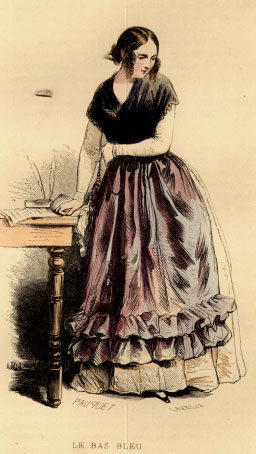image banks
--l'assiette au beurre
--Les Quatre Saisons de la Kultur
 |
 |
From: Sentimental Education
...Mademoiselle Vatnaz was there.
She was one of those Parisian spinsters who, every evening, when they
have given their lessons, or tried to sell their little drawings or place
their pitiful manuscripts, go home with mud on their pettcoats,cook their
dinner,eat it all alone, and then,with their feet on a foot-warmer, by
the light of a smoking lamp, dream of a love-affair, a family, a home,
a fortune - everything they have not got. Consequently, like many others,
she had greeted the Revolution as the harbinger of revenge; she was devoting
herself passionately to Socialist propaganda
According to Mademoiselle Vatnaz, the emancipation of the proletariat
was possible only through the emancipation of women. She wanted the admission
of women to all types of employment, investigation into the paternity of
illegitimate children, a new legal code, and either the abolition of marriage
or at the very least "a more intelligent regulation of the institution.'
In her opinion, every Frenchwoman should be obliged to marry a Frenchman
or to adopt an old man.Wet-nurses and midwives should become civil servants;
and there should be a jury to examine books by women, special publishers
for women, a polytechnic school for women, a National Guard for women,
everything for women! And seeing that the Government did not recognize
their rights, they would have to conquer force by force. Ten thousand citizenesses,
armed with good muskets, could make the Hôtel de Ville tremble.
Frédéric's candidature seemed to promise well for her
ideas. She encouraged him, showing him fame on the horizon. Rosanette was
delighted to have a lover who was going to speak in the Chamber.
'Ant then perhaps they'll give you a good post.'
Frédéric, the weakest of men, was infected by the general
madness. He wrote a speech and went to show it to Monsieur Dambreuse.
At the sound of the main gate closing, a curtain behind one window
opened a little way and a woman appeared. He had not time to see who it
was. In the hall a picture caught his eye and halted him in his tracks.
It was Pellerin's picture, which had been placed on a chair, temporarily
no doubt.
It showed the Republic, or Progress, or Civilization, in the form of
Christ driving a locomotive through a virgin forest. After looking at it
for a moment, Frédéric exclaimed:
'How utterly appallingl'
'Isn't it?' said Monsieur Dambreuse, who had heard this remark as he
came in and assumed that it referred, not to the painting, but to the doctrine
which the picture glorified.